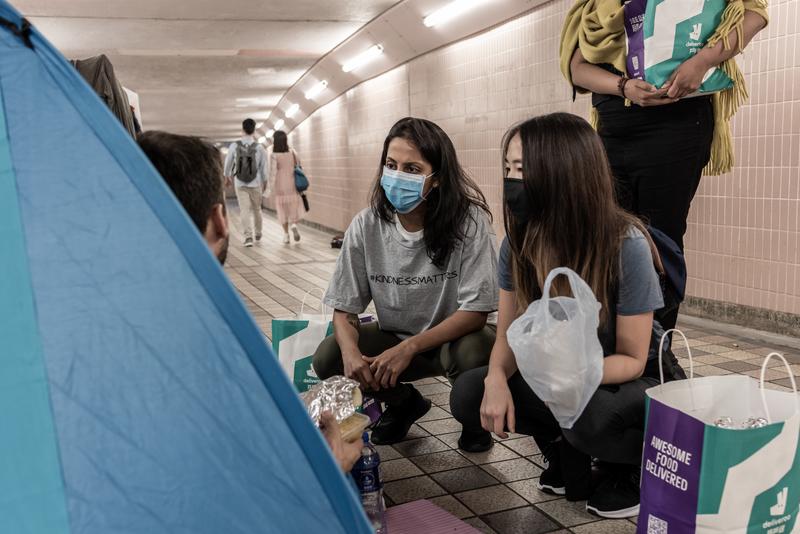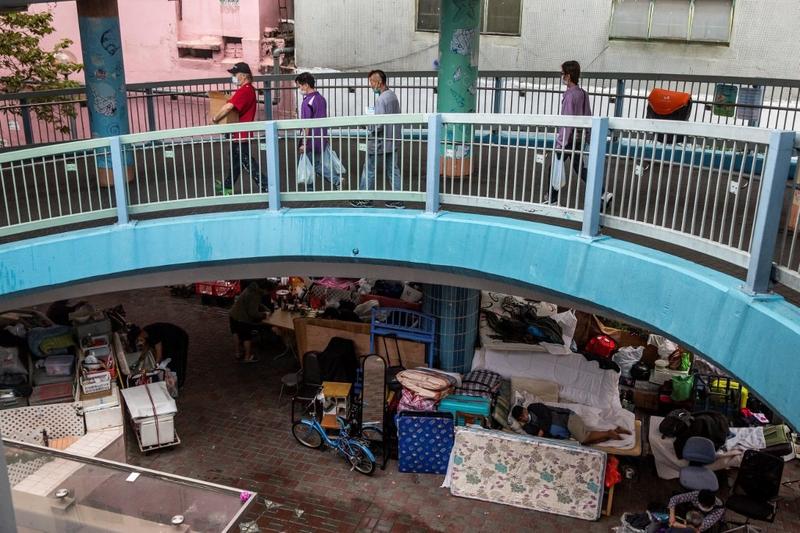 This undated photo shows ImpactHK volunteers talking to a homeless man in Hong Kong after distributing food packs to him during the coronavirus outbreak. (PHOTO PROVIDED TO CHINA DAILY)
This undated photo shows ImpactHK volunteers talking to a homeless man in Hong Kong after distributing food packs to him during the coronavirus outbreak. (PHOTO PROVIDED TO CHINA DAILY)
HONG KONG – Hong Kong is seeing a spike in its homeless population as the COVID-19 pandemic further marginalized this disadvantaged stratum in one of the world’s least affordable cities.
According to latest Social Welfare Department (SWD) figures, Hong Kong had 1,491 registered street sleepers as of September this year, rising from 1,297 before the pandemic hit. Older, third-party studies have repeatedly suggested the actual number could be higher.
Helping hands
Jeff Rotmeyer, founder and CEO of local NGO ImpactHK, saw “an overwhelming number of new faces” on the streets since COVID-19 reared its head in the city. What is even more alarming is that quite a number of people younger than the usual cohort became street sleepers, he said.
ImpactHK, founded in 2017, is a leading non-profit organization that primarily works with homeless people, striving to provide food and shelters for them. Talking to China Daily over the phone, Rotmeyer said his organization has been recently distributing roughly 500 meals per day to the homeless, a significant jump from the pre-pandemic average of 200.
Rotmeyer, a Canadian-born English teacher who moved to Hong Kong in 2006, is getting banking giants like HSBC and UBS as well as individual volunteers involved in targeted outreach such as sponsored “Kindness Walks” in the evening to distribute food packs to the homeless.
“(The homeless) community has really lost hope in seeing any possible way to get off the streets to find a healthy and happy future,” said Rotmeyer.
He called for leadership from the government to “educate people about the importance of caring for people in need”.
ALSO READ: Never a home sweet home
 An ImpactHK employee (top center) and other volunteers carry supplies of face masks, hand sanitizers, food and drinks to hand out to the homeless who live under a pedestrian walkway in Hong Kong on March 28, 2020. (ISAAC LAWRENCE / AFP)
An ImpactHK employee (top center) and other volunteers carry supplies of face masks, hand sanitizers, food and drinks to hand out to the homeless who live under a pedestrian walkway in Hong Kong on March 28, 2020. (ISAAC LAWRENCE / AFP)
During the pandemic, NGOs, many sponsored by philanthropic arms of local corporations, seem to be playing a bigger role in helping the needy.
For example, Swire Group set aside about HK$29 million (US$3.74 million) to help the city’s vulnerable groups since early this year. In collaboration with more than 100 NGOs, churches and schools, the group has delivered fresh food packs to underprivileged beneficiaries living in the city’s poor neighborhoods.
(The homeless) community has really lost hope in seeing any possible way to get off the streets to find a healthy and happy future.
Jeff Rotmeyer, founder and CEO of local NGO ImpactHK
“We work closely with our NGO partners to understand the most pressing needs amongst vulnerable groups in society, and sponsor the most impactful solutions through our donations. We really value feedback from our beneficiaries and NGOs which, in turn, help shape our priorities and identify where help is most needed,” Tina Chan, head of philanthropy at Swire Trust, said in texted responses.
Setting priorities
Responding to a query about the parameters for selecting NGOs to partner with, Chan said like-mindedness and having shared missions are essential. “We support the most pragmatic and relevant projects for the community and allocate the right level of resources to the groups which require support from us. ...we will also assess the organization by their management and team capabilities, as well as the effectiveness of their proposed solutions.
“Some NGOs have expressed challenges in staying connected with the community with their traditional fundraising approaches and campaigning. As a result, we selected a few NGO partners to receive in-depth auditing to evaluate where they stand in terms of their digital strategy and what gaps to fill to strengthen their services and operations.”
Wong Hung, associate professor at the Chinese University of Hong Kong’s Department of Social Work, attributed the spike in the city’s homeless population to an abysmal lack of affordable housing.
“The Hong Kong government should play a bigger role in providing emergency shelters, hostel, transitional and social housing to increase the supply of affordable housing. Legislation of rent control (laws) for private rental housing will also help control the rising rent,” Wong, who has been studying homelessness for two decades, said in an emailed reply.
Help from govt
For street sleepers, 636 places are currently available for temporary accommodation, including 222 subvented hostel places operated by NGOs and 414 hostel places operated by NGOs in self-financing mode, as per SWD data.
“We also focus on groups that are easily overlooked by other (government) relief support programs,” said Swire’s Chan, who also noted that the fund also provided 500 underprivileged families living in subdivided residential units with HK$5,000 each “to keep a roof over their heads”.
In an emailed reply, an SWD officer, Bernard Poon, said: “The SWD provides support for homeless people through subvented NGOs operating three Integrated Services Teams for Street Sleepers (ISTs), each providing a wide range of services including outreach visits, counselling, employment support/guidance, service referrals, emergency fund and provision of facilities for street sleepers to have bathing, haircut and meal arrangement.
“The SWD also provides subvention for NGOs to operate urban hostels for single persons and emergency hostels. During the epidemic, ISTs have stepped up their efforts to proactively reach out to street sleepers, providing them with up-to-date health related information and in-kind assistance such as face masks and hand sanitizers as well as referring them to hostels as appropriate.”
With winter approaching, the city’s homeless could certainly do with all the help they can get.
READ MORE: Hong Kong: A glitzy metropolis with 1 million in poverty
Contact the writer at jefferygu@chinadailyhk.com


